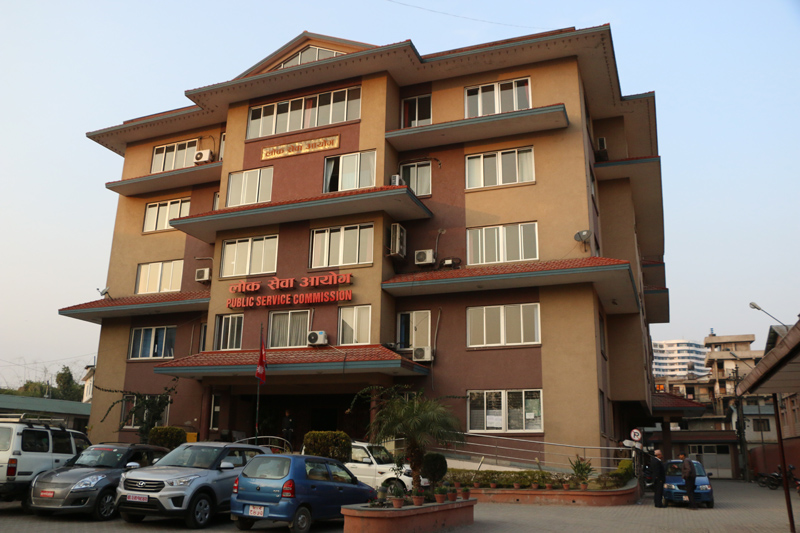Furore over PSC decision
Kathmandu, June 1
The Public Service Commission’s decision to recruit 9,161 employees for local levels as demanded by the Ministry of Federal Affairs and General Administration led to protests in the streets of Kathmandu and angered provincial governments with Province 2 government threatening to take the issue to the court.
Government job aspirants marched through the streets of Kathmandu protesting against the PSC’s decision to recruit staffers for local levels. They chanted slogans against the PSC ‘for not honouring the principle of inclusion,’ in the advertisement placed in Gorkhapatra on May 29.
The PSC has not allocated seats for all the clusters that qualify for reservation in government jobs as per the provisions of Article 42 of the constitution.
Article 42 of the constitution stipulates: Socially backward women, Dalit, indigenous people, indigenous nationalities, Madhesi, Tharu, minorities, persons with disabilities, marginalised communities, Muslims, backward classes, gender and sexual minorities, youths, farmers, labourers, the oppressed or citizens of backward regions and indigent Khas Arya shall have the right to participate in the state bodies on the basis of inclusive principle.
In its advertisement, the PSC has allocated some seats for some clusters but not for all the clusters.
Minister of Law, and Internal Affairs of Province 2 Gyanendra Yadav told THT that his government could sue the PSC for erroneous advertisement. “Our chief minister had told the prime minister that we were going to recruit local staff as per provincial laws and the central agencies should not interfere, yet, the PSC opened vacancies for local level employees,” Yadav added.
Province 2 Chief Attorney Dipendra Jha told THT that the PSC, which was supposed to maintain neutral role had courted controversy by toeing the government’s line on the advertisement issue.
“Recruitment of local level staffers should happen as per provincial laws and constitutional provision but the PSC invoked the Government Employees Adjustment Act to recruit staffers. This is wrong because provincial governments are in the final stage of enacting their laws to govern the process of recruitment of local level employees,”
Jha said and added that the PSC should not think of undermining the powers of the provincial government.
He further said that the PSC’s argument that requirement of the determination of class-wise percentage of inclusion had led to reduction of some inclusion seats was wrong.
The spirit of the constitution and the PSC law is that the percentage of inclusion should be sought in total sectoral seats and not class-wise seats, he argued.
Advocate Sunil Ranjan Singh, who filed a case against Sanskrit University eight years ago and got the recruitment advertisement for lecturers quashed by the Supreme Court on the ground that the advertisement violated the principle of inclusion guaranteed by the Interim constitution, told THT that the PSC’s advertisement violated constitutional and PSC laws and could thus be challenged in the court.
According to Singh, the PSC must adhere to the allocation of seats as per the clusters provisioned in Article 42 of the constitution.
Singh said the PSC wrongly invoked the principle of necessity in order to recruit staffers for local levels.
“On the one hand, the PSC said that it could not ensure inclusion because there were not enough seats in all local levels, while on the other, it acted as the guardian of local levels usurping the powers of provincial government,” Singh said.
Spokesperson for the PSC Kiran Sharma admitted flaws in the advertisement, but said since the PSC followed the existing rules and traditions; it could not do more in the advertisement.
“The Ministry of Federal Affairs and General Administration told us to recruit employees for 515 local levels telling us to treat all of them as single unit. This is the main reason we failed to categorise seats as per all clusters that qualified for reservation,” Sharma said. “Had the ministry told us to allocate reservation seats as per the cluster in total seats, we could have done that but the existing laws stipulated local levels as autonomous bodies that were to be treated as independent units,” Sharma added.






